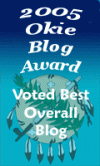"As God Is My Witness, I'll Never Be [Insert Euphemism Here]"
Actions speak loud than words. Yeah, in fairy tales, maybe. In the lumbering machinations of federal bureaucracy, however, words are important enough to warrant constant Orwellian tinkering.
The latest examples comes from the U.S. Department of Agriculture, which has determined that "hungry" is no longer an appropriate term to describe the 12 percent of Americans who go, umm ... without food at night. As the Washington Post reports, "the USDA has determined 'very low food security' to be a more scientifically palatable description for that group."
Nice (and typical) work from a White House administration that never ceases to amaze at its ability to shove its thumb up its, umm ... collective rectal hidey-hole.























8 Comments:
I'm hungry right now. Very hungry.
I would humbly suggest that in reading the Post's story it seems that a USDA sociologist drove this change. I'd be willing to wager that most sociologist are not conservatives, but I don't know about this case. Regardless, this seems driven more by the unfortunate trend of politically-correct Orwellian doublespeak in our culture as well as typical, onerous government bureaucracy than any political agenda. It's the same reason calling people "poor" is no longer acceptable in liberal circles. Now they're "disadvantaged."
Read journalist Edwin Newman's classics on the devolution of American language he first wrote in the 1970s and 1980s -- such things were already happening then.
Reddirt, I would suggest to you that not everything has to be segmented into a Democrat/Republican or conservative/liberal dynamic. To tell you the truth, I think the Who was on to something -- at least partially -- when they suggested that the new boss is, by and large, same as the old boss.
In other words, the USDA doublespeak seems fairly consistent with an administration that like to toss out phrases like Patriot Act and Blue Skies for policies decidedly more shaded, but it is NOT an ideological argument.
By the way, I don't know that sociologists are more prone to be liberal any more than the assumption that evangelicals are more likely to be conservative.
RedDirt, you can go back further and read Orwell's essay "Politics and the English Language." I've got to agree with Chase, in that the abuse of language doesn't break down to a liberal/conservative issue. Mostly it's about power--if you control the language people use, you control the way they think.
Outside of politics, I think the worse abuses come at the hands of the business community. Rather than being so much about power or controlling the dialogue, or even political correctness, corporate-speak seems based on the assumption that using two or three big words when one small one would do somehow makes you seem smarter, more educated, and professional. Hence we see near-meaningless words like "integrated" and "solution" tacked on to every noun.
When I read the story I thought the change meant some group was getting their budget cut by the government. Maybe using more words than necessary just makes people feel smarter. Since I have a sociology degree I would like to suggest the phrase "nutritionally low caloric reserve".
Actually I would agree with both Chase and Conrad that the Orwellian doublespeak is happening across the political spectrum (that's precisely why I brought up the "poor"/"disadvantaged" example). I was just making the point that in this particular case, the Post's story seemed to me to suggest that this particular example was not driven by any particular political agenda -- just a general cultural drive toward euphemistic language. It seemed a lot muddier than right vs left. That's all I was saying.
Anyone remember the old George Carlin bit about this and our increasing tendency towards what he called 'soft language?' "Shell Shock" became "Post Traumatic Stress Disorder," and "Toilet Paper" became "Bathroom Tissue," ect. It's all about making insulated, head-burying-in-the-sand Americans feel more "comfortable" with things we find distasteful.
See, I think turtle hits the nail on the head precisely.
"The poor" sounds too hard. But poverty is very hard, and being impoverished is precisely their experience -- not being "disadvantaged."
When someone is hungry, they're hungry! Not calorically-challenged.
Why can't we as a society acknowledge these tough things anymore? Turtle, I think Americans have turned into a bunch of intellectual pansies, on the right and the left.
reddirt said: "The poor" sounds too hard. But poverty is very hard, and being impoverished is precisely their experience -- not being "disadvantaged."
I think people use the term disadvantaged because it describes the situation rather than the person. "Poor" is a synonym of "lousy," and applying that to a person may be inaccurate. "Impoverished," arguably, does not have the same level of negative connotation as "poor."
Post a Comment
<< Home